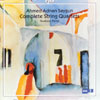Saygun Complete String Quartets
A Turkish anti-Romantic catches the ear
View record and artist detailsRecord and Artist Details
Composer or Director: Ahmet Adnan Saygun
Genre:
Chamber
Label: CPO
Magazine Review Date: 7/2006
Media Format: CD or Download
Media Runtime: 102
Mastering:
Stereo
DDD
Catalogue Number: CPO999 923-2

Tracks:
| Composition | Artist Credit |
|---|---|
| String Quartet No 1 |
Ahmet Adnan Saygun, Composer
Ahmet Adnan Saygun, Composer Danel Quartet |
| String Quartet No 2 |
Ahmet Adnan Saygun, Composer
Ahmet Adnan Saygun, Composer Danel Quartet |
| String Quartet No 3 |
Ahmet Adnan Saygun, Composer
Ahmet Adnan Saygun, Composer Danel Quartet |
| String Quartet No 4 |
Ahmet Adnan Saygun, Composer
Ahmet Adnan Saygun, Composer Danel Quartet |
Author: David Gutman
The CPO label has already given us five symphonies by Ahmed Adnan Saygun (1907-91), probably the premier Turkish composer of the 20th century. Saygun was closely identified with the modernising policies of Kemal Atatürk, whose attempts to forge a progressive, secular identity for post-Ottoman Turkey included the dispatch of promising musicians to European capitals for specialised training. Saygun was taught in Paris by Vincent d’Indy but it was his later immersion in Anatolian folk music, including a joint expedition with Béla Bartók in 1936, that helped him find his mature voice.
I’m sure the four quartets will surprise you as they surprised me. Saygun clearly viewed the form from an anti-Romantic perspective with potentially ‘colourful’ native elements transmuted into a sophisticated, dissonant, increasingly abstract idiom. The First Quartet (1947), the only one of the set previously recorded, is also the only one notated as being ‘in’ a key, although it’s more modal than tonal. Sample, if you can, the haunting Adagio (disc 1, track 2) succeeded by an insinuating, minuet-like Allegretto. Much of the Second, written for the Juilliard in 1958 after Stokowski’s successful New York unveiling of the oratorio Yunus Emre, is plainly indebted to Bartók. Elsewhere Saygun seems content to meander, albeit in vaguely hypnotic fashion.
The Third Quartet (1966), oddly shaped, ultimately repetitious, is not a little inscrutable, while the Fourth’s a mere torso, composed, like Haydn’s Op 103, in extreme old age. The composer would surely have been delighted by these performances. There’s only the occasional sniff to complain about. Just don’t expect easy listening.
I’m sure the four quartets will surprise you as they surprised me. Saygun clearly viewed the form from an anti-Romantic perspective with potentially ‘colourful’ native elements transmuted into a sophisticated, dissonant, increasingly abstract idiom. The First Quartet (1947), the only one of the set previously recorded, is also the only one notated as being ‘in’ a key, although it’s more modal than tonal. Sample, if you can, the haunting Adagio (disc 1, track 2) succeeded by an insinuating, minuet-like Allegretto. Much of the Second, written for the Juilliard in 1958 after Stokowski’s successful New York unveiling of the oratorio Yunus Emre, is plainly indebted to Bartók. Elsewhere Saygun seems content to meander, albeit in vaguely hypnotic fashion.
The Third Quartet (1966), oddly shaped, ultimately repetitious, is not a little inscrutable, while the Fourth’s a mere torso, composed, like Haydn’s Op 103, in extreme old age. The composer would surely have been delighted by these performances. There’s only the occasional sniff to complain about. Just don’t expect easy listening.
Discover the world's largest classical music catalogue with Presto Music.

Gramophone Digital Club
- Digital Edition
- Digital Archive
- Reviews Database
- Full website access
From £8.75 / month
Subscribe
Gramophone Full Club
- Print Edition
- Digital Edition
- Digital Archive
- Reviews Database
- Full website access
From £11.00 / month
Subscribe
If you are a library, university or other organisation that would be interested in an institutional subscription to Gramophone please click here for further information.




